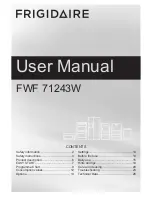
GB
15
Before placing the dishes in the racks, remove the largest
scraps of food left over on your plates, you will thus avoid
blocking the filter, which would reduce the efficacy of the
wash.
If the saucepans and frying pans are very dirty, allow them
to soak before being washed.
You will thus avoid having to wash them again.
To make it easier to load your dishes, pull the racks out
fully.
How to use the lower rack
We recommend you place the most difficult dishes to wash
into the lower rack:
pans, lids, dinner plates and soup plates as illustrated in
the figure to the left.
Serving dishes and large lids should preferably be placed
on the sides of the rack, without for that matter obstructing
the rotation of the top sprayer arm.
- pans, salad bowls etc. must always be placed upside down
- very deep dishes should be placed obliquely, thus allowing
water to run down them freely.
- Insert the cutlery into the basket: knives and utensils
with sharp blades or tips should be positioned with the sharp
parts at the bottom. Position all cutlery items so that they
don't touch.
If the rack has side baskets, the spoons should be loaded
individually into the appropriate slots (see fig. A).
- Especially long utensils should be placed in the horizon-
tal position at the front of the upper rack.
How to use the upper rack
Place delicate and lightweight dishes in the upper rack:
glasses, tea cups and coffee cups, saucers - but plates too
- shallow salad bowls, slightly dirty frying pans and shallow
pans (the photo illustrates a few examples).
Position lightweight dishes in such as way as to avoid their
being moved by the spray of water.
The upper rack can be equipped with one or two special
tip-up compartments for mugs and cups, as well as spoons,
knives and forks, which should be fitted in the slots
provided. Stemmed glasses can be hooked onto these
compartments by threading the stems into the slots
provided (see fig. D).
After loading the dishes, remember to check that the blades
on the sprayer arms can turn freely without knocking
against any dishes.
How to adjust the upper rack ….
The upper rack can be set in a high or low position. To do
so, open the rail stop flaps and pull the rack out completely;
now place it with the back wheels in high or low position,
then slide it along the guide rails until the front wheels
also go in; now close the rail stop flaps (see fig. F).
Loading the dishes
Upper rack
Load examples
1
2
3
4
Fig. F
Lower rack
A
A
fig. D
















































